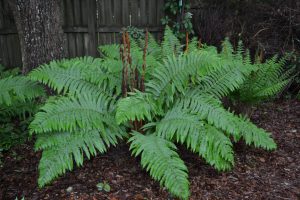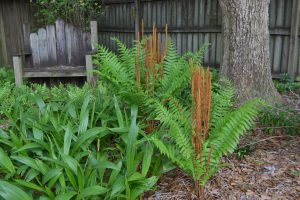If you enjoy a walk in some of the Panhandle’s naturally wooded areas you often come across many selections of ferns. One of my favorites to come across is the cinnamon fern, Osmundastrum cinnamomeum.

Green fronds are pinnately compound. Fertile fronds with spores emerge in the center. Photo by Beth Bolles, UF IFAS Extension Escambia County.
This clumping fern grows to about 2-3 feet in height. It can be larger when there is ample moisture. In the spring, it forms fertile fronds in the center that are reddish-brown in color. The sterile leaves emerge from the base of the plant to form large leaves about 2 feet in length. Leaves will be green most of the year, depending on available moisture, and can offer some fall color as they die back.
A shaded portion of my backyard has four well established cinnamon ferns. I was able to purchase these from a nursery about 20 years ago. Even without moist soils on my property, the ferns do well with average rainfall.
My favorite season for the cinnamon fern is the spring with the contrasting colors of the sterile and fertile leaves. The plants make an attractive display, mixed with ground orchids, toad lily, and the leaf mulch from the live oak tree.

Coarse texture of the ground orchids blend well with the fine textured leaves of the cinnamon fern. Photo by Beth Bolles, UF IFAS Extension Escambia County.
Plan your area carefully if you want to add cinnamon fern since there will not be foliage present in the winter months. Blending these plants with some evergreens creates a low maintenance spot in a shady portion of your landscape.
- GIP Live Foodscaping: Questions and Answers - April 3, 2025
- Red Buckeye Signals Spring is Coming - March 6, 2025
- Video: Pruning Tips for Removing a Branch - February 13, 2025
